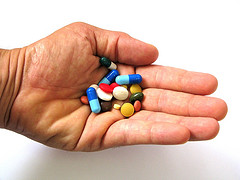Our discussions of Medicare and Medicaid fraud on this blog include a wide-range of schemes and schemers. In most cases, however, the people running the scam are on the provider-side of the health care equation; they are medical professionals, medical supply companies, health care facilities, or otherwise involved in the provision of care to patients. While rarer, beneficiary-committed health care fraud does occur, meaning cases in which a beneficiary is the primary fraudulent actor rather than a pawn in a provider’s scheme. Perhaps the subset of health care fraud that is most often committed by beneficiaries is prescription fraud. Of course, beneficiaries aren’t the only ones involved in prescription fraud, but our Medicaid and Medicare prescription drug fraud lawyer finds their role makes this form of fraud a unique threat.
Pennsylvania Woman Indicted for Prescription Fraud
 While the specific case involves fraud against private insurers, charges filed in Pennsylvania provide an example of this type of fraud. Pittsburgh’s WTAE reports that Kari Richards of Latrobe, PA was indicted in a U.S. District Court last week on charges including health care fraud and obtaining prescription medication via fraud. According to police, Richards visited in excess of 100 hospitals spanning 11 states to obtain prescription medication for shoulder injuries that she actually inflicted on herself. Over 16 months, she allegedly sought hospital care more than 300 times. Authorities claim that, between January 2014 and April 2015, Richards ultimately obtained 190 prescriptions for opiate medications including oxycodone. The grand jury indictment suggests the frauds against Highmark Community Blue Shared Cost plan totaled more than $600,000. Richards was arrested and then released pending trial.
While the specific case involves fraud against private insurers, charges filed in Pennsylvania provide an example of this type of fraud. Pittsburgh’s WTAE reports that Kari Richards of Latrobe, PA was indicted in a U.S. District Court last week on charges including health care fraud and obtaining prescription medication via fraud. According to police, Richards visited in excess of 100 hospitals spanning 11 states to obtain prescription medication for shoulder injuries that she actually inflicted on herself. Over 16 months, she allegedly sought hospital care more than 300 times. Authorities claim that, between January 2014 and April 2015, Richards ultimately obtained 190 prescriptions for opiate medications including oxycodone. The grand jury indictment suggests the frauds against Highmark Community Blue Shared Cost plan totaled more than $600,000. Richards was arrested and then released pending trial.
An Important Message on Prescription Drug Abuse
Before going any further, we want to make an incredibly important comment. Prescription fraud is a multi-faceted problem. For the purposes of this discussion, we are focusing on the financial impact of this form of fraud. In many cases, prescription fraud also involves prescription drug abuse with the beneficiary either using the medications himself or selling the pills to others who abuse the drugs, medications that can be even more addictive than illicit/illegal drugs. We are focusing on the financial side of these crimes, but this is a major public health issue and one we wouldn’t want to ignore. If you believe someone you know is battling a drug addiction, visit the Substance Abuse and Mental Health Services Administration webpage for a link to programs in your area that can help.
The Financial Impact of Prescription Drug Fraud
The likely extent of the financial cost to government programs from pharmaceutical fraud, including beneficiary-perpetrated scams, is staggering. In a list released in February 2015, the Department of Health and Human Services (“HHS”) lists “Ensuring Appropriate Use of Prescription Drugs in Medicare and Medicaid” among the top challenges it faced in 2014. HHS notes that Medicare Part D provides prescription coverage to 37.4 million individuals and Medicaid  prescription plans cover 59.4 million with a total of more than $93 billion spent on prescription drugs for the combined groups in 2014.
prescription plans cover 59.4 million with a total of more than $93 billion spent on prescription drugs for the combined groups in 2014.
In a press release issued in 2011 in support of his reform proposals, some of which were enacted in different forms this year, Representative John Carney of Delaware cites a Government Accountability Office report identifying 650,000 Medicaid beneficiaries who visited 6 or more doctors in order to obtain prescriptions for 10 frequently abused medications. These prescriptions alone, obtained in circumstances suggesting fraud, cost Medicaid $63 million. These cases are merely a narrow part of the overall picture of Medicare/Medicaid beneficiary prescription fraud.
The Importance of the Fight Against Fraud and the Role of the Individual in Ending Health Care Fraud
Referring to Medicare and Medicaid, HHS states: “Maintaining the integrity of these two programs is critical to ensuring patient safety; safeguarding the quality of care; protecting the programs from fraud, waste, and abuse; and protecting taxpayer dollars.” Individuals commit many of these frauds and we believe individuals can help fight them. Individuals can also fight other forms of prescription fraud including schemes perpetrated by pharmacies and prescribers. Provisions of the False Claims Act and its state counterparts specifically envision individuals as key to the fight against government fraud. If you are aware of a Medicare/Medicaid drug fraud scheme, call our prescription drug fraud lawyer at 800-427-7020 to learn how you can help.
See Related Blog Posts:
The Dangerous Trend of Medical Professionals Fueling the Epidemic of Prescription Abuse
Focusing on a Form of Pharmaceutical Fraud: Doctor Indicted for Selling Narcotic Prescriptions
(Image of hand by V1ctor Casale; Image of open pill by Bill David Brooks)
 Healthcare Fraud Lawyer Blog
Healthcare Fraud Lawyer Blog


